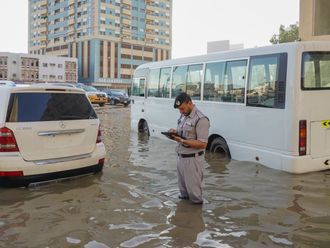Dubai: A few residents are upset over jaywalking fines imposed by policemen in plain clothes.
According to the Dubai Police Traffic Department, policeman in plain clothes are allowed to issue fines after presenting their ID.
Most pedestrian accidents are caused by jaywalking. Earlier this year, Gulf News reported that jaywalking accounted for the majority of all pedestrian deaths so far.
In the first five months of 2012, there were 152 pedestrian accidents, in which 161 pedestrians and 5 drivers sustained injuries, and 14 pedestrian died.
In the first five months of 2011, there were 128 pedestrian accidents in which 140 people were injured including 5 drivers, 1 passenger and 134 pedestrians, out of which 14 pedestrians died.
Gulf News also reported that police advised pedestrians not to cross roads with speeds of more than 80 km/h because they could be held liable for any accidents. Further, jaywalking on any road (excluding the small roads in communities) from undesignated spots is a crime punishable by the UAE Traffic Law with a fine of Dh200.
Residents spoke to Gulf News about the issue of being fined for jaywalking by policemen in plain clothes.
Yvonne Cabral, a resident of Karama and an IT professional, said. “I was stopped by a policeman in civilian clothes near Karama Centre. He was waiting on the other side.”
She said she was appalled the way the offence is being handled. “Not only did he wait for me to cross the road, he was waiting for others to cross as well. He stopped a few people halfway, pulling them back to fine them. What upset me the most was that he asked me to cross the same undesignated patch of road to collect my fine slip [Dh 210] from a parked civilian car.”
Bryan Scott, a resident of Al Nahda, said he heard a man screaming behind him crossing the road near NMC Hospital. “I turned around, but didn’t stop because I didn’t know him. He was dressed in shorts, T-shirt and was wearing a cap,” he said.
When Scott crossed the road to the ATM he was heading for, he was accosted by the same man who led him to a white van parked close by. “He showed me his ID and gave me the fine slip,” he said.
As an expat who moved to the city three months ago, he said he didn’t know jaywalking was against the law. “The law should give residents warnings. In fact, all offences should be part of an awareness campaign. In my case, I would have given the policemen more respect had he been in uniform.”
Cynthia Fernandes and Emmanuelle Milton also had similar experiences in Garhoud and Al Barsha respectively. Fernandes, a media professional, said that she was crossing the area near Motivate Publishing when she was fined. “There is no pedestrian crossing to get towards the City Centre area, and I was ashamed to get caught. Worse it was by a policeman in plain clothes. I probably wouldn’t have crossed if I had spotted the familiar green uniform.”
Milton, an IT manager, said, “I have been fined four times near the Lulu Supermarket area in Al Barsha by policeman in civilian clothes. I usually use this area around 6pm, after work. I would have to walk for almost half a kilometre to get to a pedestrian crossing.”
Roy D’Lima, a professional in the construction field, who has been fined by a policeman in uniform, said he would have been uncomfortable being fined by an officer in civilian clothes. “To establish authority one would need to ask for ID proof,” he said. He added that a man in uniform commands respect, and is in a better position to uphold the law. To reduce pedestrian deaths on roads, the Roads and Transport Authority has planned 13 more pedestrian bridges at various locations in Dubai, bringing the total number from 74 to 87.












